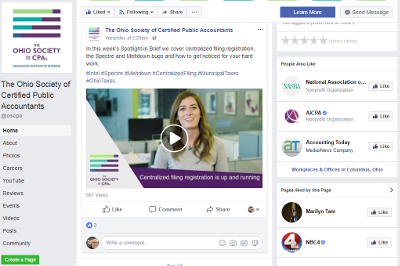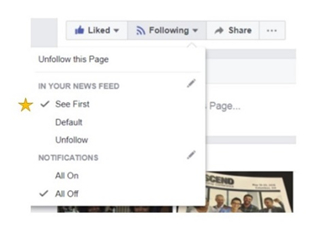The changes coming to a Facebook feed near you
By Molly Ryan Kowaleski, content & community manager
Mark Zuckerberg recently overhauled your Facebook news feed. According to a post released earlier this year, individuals can expect to see more videos, photos and posts from family and friends and less from businesses, brands and the news media.
 If you only use Facebook to connect with friends and family, this is likely welcome news; but, if you run your company’s Facebook page, this is justifiably getting a lot more of your attention. Many industry experts predict the changes will spell disaster for brands (unless they switch up their strategy, that is).
If you only use Facebook to connect with friends and family, this is likely welcome news; but, if you run your company’s Facebook page, this is justifiably getting a lot more of your attention. Many industry experts predict the changes will spell disaster for brands (unless they switch up their strategy, that is).
So, if you’re in charge of your company’s Facebook strategy, where do you start?
Here are the most important questions you should be asking:
1. How are my posts performing right now?
Getting a benchmark is crucial and the sooner the better. You need to know if the changes are affecting your business’ page at all, and, if so, how. And, you will only be able to test out new strategies if you have something to which you can compare them.
2. After reviewing the news feed changes, is your page an offender of any of the tactics discussed?
Zuckerberg did not pull these ideas from nowhere, nor did anyone else at Facebook. So, ask yourself whether your page’s marketing tactics have encouraged the “passive engagement” mentioned. Maybe this is an opportunity to clean up some of the tactics your page has been utilizing in favor of more engaging content. Facebook would venture to say your audience wants that. And speaking of what your audience wants…
3. Is the content you’re sharing the content your audience wants to see?
This is a fundamental strategy question, and if the answer is no, you might want to fry some bigger fish before addressing how the content is performing on social media.
If the answer is “yes” or “kind of, maybe, we think,” and you notice your engagement starting to decrease, consider testing other formats (e.g. if you normally share blog posts, try turning these into live videos) or reframe the post copy so the audience is more likely to comment. For example, if you wrote a blog post about tax reform, you normally might post something along the lines of “Check out the latest update on tax reform.” Consider something like this instead: “How do you think tax reform will impact tax filings this year?”
Beware of “engagement baiting,” though, which Adam Mosseri, Facebook’s head of news feed, specifically mentions in this Facebook newsroom post about the changes: “Using ‘engagement-bait’ to goad people into commenting on posts is not a meaningful interaction, and we will continue to demote these posts in News Feed.”
4. Can we afford to spend (more) money on Facebook advertising or promoted posts?
If the answer is yes, consider meaningful ways to apply extra cash to your current (or updated) strategy. As of now, the changes are not expected to impact the ranking of advertisements. However, as Paul Ramondo, a digital and social media marketing expert, notes in this Social Media Examiner blog post, Facebook advertisers now might face a classic example of supply and demand and experience higher costs for their ads to appear in news feeds.
If the answer is no, it’s time to prioritize the content you share and test which changes affect post performance – e.g. narrowing your audience, changing the time of day or day of the week you post, the length/format of your posts, etc. If nothing you test seems to make a difference, it might be time to explore other options outside of Facebook to reach your target audience, though you should consider that a last resort for now.
Unfortunately, brands can expect their organic engagement to suffer as Facebook rolls out the changes. That is inevitable. But, it might be possible to bounce back if you diligently track the results and test a variety of solutions. The only thing that is clear: Your page will not gain any traction if you continue doing what are doing right now.
What it boils down to, as it so often does where social media are concerned, is quality interactions with your audience. The more meaningful the conversations on your posts, the better off your page will fare.
 To ensure you continue seeing the content you love from OSCPA, be sure you’ve liked the page and are following our posts. Near the top of the page, you can select whether to see our content first in your news feed (see left). Most importantly, though, when you do see the stories and videos we share, continue engaging with them. (Lengthy) comments and shares are what the new algorithm will prioritize.
To ensure you continue seeing the content you love from OSCPA, be sure you’ve liked the page and are following our posts. Near the top of the page, you can select whether to see our content first in your news feed (see left). Most importantly, though, when you do see the stories and videos we share, continue engaging with them. (Lengthy) comments and shares are what the new algorithm will prioritize.
Until Zuckerberg’s next bombshell, good luck and happy connecting!
